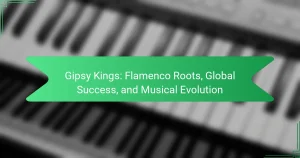Salif Keita’s journey in Afro-pop music showcases resilience and cultural pride. This article explores his musical evolution, personal story shaped by discrimination, and significant contributions to cultural identity. Keita’s unique voice and socially conscious lyrics reflect his commitment to social change, influencing the Afro-pop genre and inspiring global audiences. His recognition as a cultural icon highlights the transformative power of music in addressing contemporary issues.

How did Salif Keita’s music evolve over the decades?
Salif Keita’s music evolved significantly over the decades, blending traditional Malian sounds with global influences. In the 1970s, he began his career with the Rail Band, infusing Afro-pop with jazz and funk elements. The 1980s marked his solo debut, showcasing his unique voice and socially conscious lyrics. By the 1990s, he embraced modern production techniques, collaborating with international artists and expanding his audience. His later work continues to reflect his roots while addressing contemporary issues, solidifying his cultural significance as a pioneer of Afro-pop.
What influences shaped Salif Keita’s Afro-Pop sound?
Salif Keita’s Afro-Pop sound is shaped by his Malian heritage, diverse musical influences, and personal experiences. His unique voice and storytelling reflect traditional West African rhythms and modern pop elements. Cultural significance arises from his advocacy for social issues, particularly regarding albinism. Collaborations with various artists have further enriched his sound, blending genres and expanding his reach.
Which musical genres intersect with Salif Keita’s style?
Salif Keita’s style intersects with various musical genres including Afrobeat, Jazz, Reggae, and traditional Malian music. His unique blend incorporates elements of these genres, resulting in a distinctive sound that emphasizes rich melodies and cultural storytelling. Afrobeat influences his rhythmic structures, while Jazz adds improvisational elements. Reggae contributes to the social and political themes present in his lyrics. This fusion highlights Keita’s role in the evolution of Afro-Pop and his cultural significance in promoting African music globally.
How has technology impacted the distribution of his music?
Technology has significantly transformed the distribution of Salif Keita’s music, enhancing accessibility and reach. Digital platforms like streaming services and social media have allowed his work to connect with a global audience. This evolution has enabled fans worldwide to discover his Afro-Pop sound, breaking geographical barriers. Additionally, technology facilitates direct engagement between Keita and his listeners, fostering a sense of community. As a result, his music not only retains cultural significance but also adapts to contemporary trends and preferences.

What personal experiences influenced Salif Keita’s artistic journey?
Salif Keita’s artistic journey was profoundly shaped by his experiences with discrimination and cultural heritage. Growing up in Mali, he faced stigma due to his albinism, which influenced his music and message. His early exposure to traditional Malian music and the diverse sounds of West Africa enriched his Afro-Pop style. Keita’s commitment to social issues, particularly regarding disability rights, further solidified his role as a cultural icon. His journey reflects resilience and a deep connection to his roots, making his work resonate globally.
How did his upbringing in Mali shape his identity as an artist?
Salif Keita’s upbringing in Mali profoundly influenced his identity as an artist. Growing up in a culture rich in musical traditions, he absorbed diverse sounds and styles that shaped his Afro-Pop evolution. His unique heritage, being born into the Keita family, a lineage of griots, provided him with a deep connection to storytelling and music. This background fostered his commitment to addressing social issues through his art, making him a voice for the marginalized. His experiences in Mali instilled a sense of cultural pride that resonates in his music, showcasing the significance of his roots in shaping his artistic vision.
What challenges has he faced in his career and personal life?
Salif Keita has faced significant challenges in his career and personal life, primarily due to his albinism. This condition led to social stigma and discrimination, impacting his early life and career opportunities. Despite these obstacles, he persevered, becoming a prominent figure in Afro-Pop music. He has also navigated the complexities of cultural identity and representation in his work, striving to elevate African music on a global stage. His resilience has made him a symbol of hope and empowerment for many.
How does Salif Keita address social issues through his music?
Salif Keita addresses social issues through his music by highlighting themes of discrimination, identity, and resilience. His songs often reflect the struggles of marginalized communities, particularly those affected by albinism. By sharing his personal experiences, he raises awareness and promotes acceptance. His powerful lyrics serve as a voice for social change, inspiring listeners to advocate for equality and understanding. Keita’s music not only entertains but also educates, fostering discussions around critical societal challenges.

What cultural significance does Salif Keita hold in the Afro-Pop genre?
Salif Keita holds immense cultural significance in the Afro-Pop genre as a pioneer who blends traditional Malian music with contemporary sounds. His unique voice and personal story of overcoming adversity as an albino have inspired many. Keita’s work promotes African identity and social change, making him a symbol of resilience and cultural pride. His albums, such as “Moffou,” showcase his commitment to cultural heritage while appealing to global audiences. Through his music, he addresses social issues, elevating the Afro-Pop genre and influencing countless artists.
How has he contributed to the global recognition of African music?
Salif Keita has significantly advanced the global recognition of African music through his unique sound and cultural storytelling. His fusion of traditional Malian music with modern Afro-pop elements has attracted international audiences. Keita’s collaborations with global artists have further expanded his reach, showcasing African music’s diversity. His advocacy for social issues, particularly related to disability and African heritage, has also elevated the cultural significance of African music on the world stage.
In what ways does his music reflect Malian culture and heritage?
Salif Keita’s music deeply reflects Malian culture and heritage through its incorporation of traditional rhythms, instruments, and themes. His fusion of Afro-pop with traditional Malian sounds showcases the country’s diverse musical landscape. Keita often addresses social issues, personal struggles, and cultural identity in his lyrics, highlighting the unique attributes of Malian society. His use of the kora and djembe in compositions emphasizes the root cultural elements of West African music. Additionally, Keita’s personal story as a member of the griot lineage adds a rare dimension to his work, connecting his music to the historical narrative of Mali.
Which collaborations have enhanced his cultural impact?
Collaborations with various artists have significantly enhanced Salif Keita’s cultural impact. His partnerships with musicians like Cesária Évora and Youssou N’Dour have blended diverse musical styles, amplifying his reach. Additionally, his work with the group Les Ambassadeurs showcased his unique Afro-pop sound, merging traditional Malian music with modern influences. These collaborations have not only expanded his audience but also solidified his role as a cultural ambassador for African music globally.

What are the key attributes of Salif Keita’s musical style?
Salif Keita’s musical style is characterized by a blend of traditional Malian music and modern Afro-pop elements. His unique voice, often described as powerful and emotive, sets him apart in the music industry. Keita’s incorporation of diverse musical influences, including jazz and blues, further enriches his sound. Lyrically, he addresses themes of identity, social issues, and cultural heritage, reflecting his personal journey as an artist. Additionally, his commitment to promoting African culture and his advocacy for social justice enhance his cultural significance.
What lyrical themes are prevalent in his songs?
Salif Keita’s songs often explore themes of identity, love, and social justice. He reflects on his personal experiences as a person with albinism, addressing issues of discrimination and resilience. His music frequently celebrates African culture and heritage, blending traditional sounds with contemporary Afro-pop. Additionally, themes of spirituality and unity are prevalent, emphasizing connection among people and communities.
How does his vocal technique differentiate him from other artists?
Salif Keita’s vocal technique sets him apart through his unique blend of melismatic phrasing and emotional delivery. His ability to convey deep feelings in each note creates a distinctive sound that resonates with listeners. Keita’s use of traditional African scales alongside modern Afro-pop elements fosters a rich musical identity. His voice, characterized by a powerful yet smooth timbre, enhances his storytelling, making his performances captivating and memorable.
What role does instrumentation play in his music?
Instrumentation plays a crucial role in Salif Keita’s music by enhancing its emotional depth and cultural richness. His use of traditional African instruments alongside modern elements creates a unique sound that reflects his Malian heritage. For instance, the kora and balafon are often featured, adding layers of texture and authenticity to his Afro-Pop style. This blend of instrumentation not only showcases his artistic evolution but also underscores the cultural significance of his work in promoting African music globally.

Which awards and recognitions has Salif Keita received?
Salif Keita has received numerous awards and recognitions throughout his career. Notable accolades include the 2003 Kora Award for Best African Artist and the 2010 African Music Award for Best Male Artist. His contributions to music and culture earned him the title of “Ambassador of African Music” by UNESCO. Additionally, he received the 2017 African Legend Award, highlighting his influence in the Afro-pop genre. Keita’s unique blend of traditional Malian music with contemporary sounds has solidified his status as a cultural icon.
How do these accolades reflect his influence in the music industry?
Salif Keita’s accolades highlight his profound influence in the music industry through recognition of his unique sound and cultural contributions. His Grammy nominations and international awards underscore his role in popularizing Afro-Pop globally. These honors reflect his ability to blend traditional Malian music with contemporary styles, fostering cross-cultural connections. Keita’s storytelling through music resonates with diverse audiences, enhancing his status as a cultural ambassador.
What impact do his awards have on aspiring artists?
Salif Keita’s awards inspire aspiring artists by validating their creative pursuits and enhancing their visibility. His recognition highlights the importance of cultural heritage and resilience in artistry. Awards like the Kora Award and UNESCO’s International Music Prize demonstrate how success can emerge from diverse backgrounds. This encourages emerging musicians to embrace their unique stories and influences. Recognizing Keita’s achievements fosters a sense of possibility and motivation within the artistic community.

What can listeners learn from Salif Keita’s life and career?
Listeners can learn about resilience, cultural identity, and the transformative power of music from Salif Keita’s life and career. His journey reflects overcoming adversity, particularly his struggles with albinism in a society that often marginalizes individuals with this condition. Keita’s music blends traditional Malian sounds with modern influences, showcasing the evolution of Afro-Pop. His commitment to promoting African culture and addressing social issues through his art offers valuable lessons in advocacy and cultural pride. Additionally, Keita’s success demonstrates the global reach of African music, inspiring listeners to appreciate diverse musical expressions.
What best practices can emerging artists adopt from his journey?
Emerging artists can adopt resilience, authenticity, and cultural pride from Salif Keita’s journey. His determination to overcome adversity shaped his unique sound and identity. Embracing personal stories can create a deeper connection with audiences. Additionally, artists should prioritize collaboration to expand their reach and influence.
What common mistakes should artists avoid based on his experiences?
Artists should avoid over-commercialization, neglecting cultural roots, and ignoring audience engagement. Salif Keita emphasizes authenticity and connection in his journey, highlighting that straying from personal and cultural identity can alienate fans. Additionally, he advises against resisting collaboration, as partnerships can enhance creativity and broaden reach. Lastly, artists should not overlook the importance of continuous learning and adaptation in a rapidly changing music industry.


